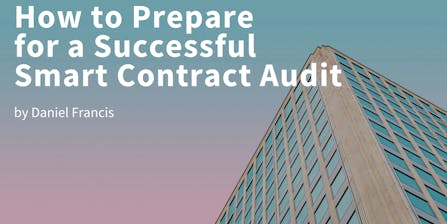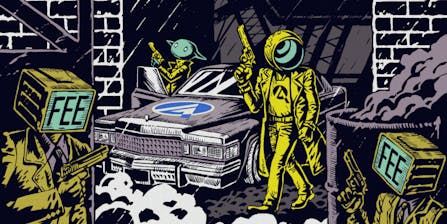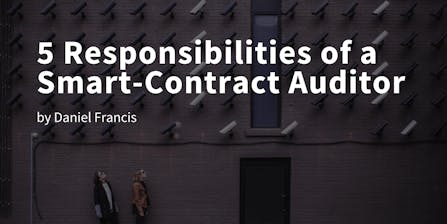
by Daniel Francis
How to Prepare for a Successful Smart Contract Audit
Aug 23, 2022Table of Contents
- Introduction
- What Is A Smart Contract Audit?
- Why Audit?
- Project Responsibilities
- Summary
Introduction
Smart contracts have emerged as the foundation of most web3 economies. They are programs like any other but are responsible for way more finances than typical applications. Smart contracts can seem simple, but one greater than symbol mistakenly typed as a less than could be detrimental to everyone using the contract when a malicious actor discovers how to exploit it.
Preparation for smart contract audits begins before the project reaches the auditor. Test-driven development is essential during the creation of the contract. Good internal control and documentation can be valuable to the auditing process. As a result, the auditor spends less time understanding the protocol and can dedicate more time determining if it does what it should and what happens when it does not.
What is a Smart Contract Audit?
A smart contract audit meticulously examines the entire code to find security and efficiency weaknesses. Typically, ensuring the code functions as intended is important, and properly written code can go a long way. "If builders built houses the way programmers build programs, the first woodpecker to come along would destroy civilization." – Jerry Weinberg. This code review is necessary because most smart contracts deal with financial assets, and with the immutable nature of the blockchain, smart contracts cannot change once deployed. Third parties typically carry out audits to ensure an objective assessment of the code and its level of compliance. These audits function as a safeguard, lowering potential business risks.
Why Audit?
Smart contracts are code like any other program, but they can also be financial vehicles, incentivizing malicious actors to find vulnerabilities to exploit. After three months of going live, The DAO was hacked for $60 million in Ether (ETH) and caused a hard fork of the Ethereum network. Minor code mistakes could be detrimental to the security and longevity of a project. Developers can not always count on a hard fork to save them in the case of a hack. The potential for vulnerabilities is why smart contracts must get audited before they are deployed on a blockchain network, especially when they are responsible for a large amount of money. As a rule of thumb, if the audit costs more than the value of the project, then it probably does not need an audit.
In 2021 NFTs became popularized, as did some dog-related currencies. They have gained significant market capital — this has motivated project creators to ensure the underlying smart contract that supports all of their projects are safe. Security is essential in cryptocurrencies since many finances could potentially be at risk when a smart contract goes live. The blockchain is not forgiving, and it removes intermediaries who could block a transaction as a bank would in traditional finance if something goes wrong. There are no standards that require projects to audit their smart contracts. An audited smart contract is regarded as trustworthy to investors, and improving the security of assets put on a smart contract, increases its overall reliability for end-users.
We created Auditone.io to match crypto projects with highly-skilled and experienced freelance auditors. Projects can learn from the audit experience, mainly how to produce better code and identify gaps in their processes. Audits can not replace internal quality assurance nor guarantee bugs or vulnerabilities would not exist, but it does ensure an expert has reviewed the contract's security.
Projects Responsibilities
The time to complete an audit is limited, and adequate preparation is necessary to get the best results. The auditors need to understand the code before they can identify vulnerabilities. Think of the auditor as a new dev team member with a short onboarding time. The project should have one senior developer available to deal with any potential critical vulnerabilities discovered during the auditing process. The contract designers must describe how their smart contract works; otherwise, the auditor will not be able to assess its possible impacts. Below are a few things a project should consider before submitting its code for an audit:
1. Documentation
The least time auditors spend trying to understand the system, the more time they can dedicate to finding vulnerabilities. The documentation should describe the systems, the problem the project intends to tackle, and the system's anticipated functionality. It should include the features of your API and protocol release process, including token creation and distribution, if applicable. Projects that have detailed documentation on their smart contract make onboarding easy.
2. Read Me
The read-me file explains the code and how to install or use it properly. It assists users in navigating the project. Since this is the first document auditors might read to learn about the project, it is critical to maintain it and keep it clean and up to date to make an excellent first impression. Incomplete read-me files can increase the time for an auditor to get started with their work since they would need to communicate with the project about missing information.
3. Clean Code
- Consistent code style.
- Use stable libraries if possible.
- Helpful comments that explain the intent of the code.
- Use NatSpecs comments; they offer comprehensive documentation for functions, return variables, etc.
- Resolve TODO/FIXME comments.
- Delete commented-out code blocks.
4. Run Tests and Analysis Tools:
The project should run a full test suite before the audit, and the test code should get updated after every edit. Running automated static analysis tools on the contract helps developers inspect the code and search for flaws or other malicious code that could give hackers access to critical data. Finally, ensure that the code compiles and executes without errors on the testnet and performs as intended before the audit.
Performing these tests frees up time for the auditors to focus on bugs and vulnerabilities that might not be as evident. Auditors will mostly likely run similar automated analyses on the submitted code, but it helps to be proactive.
5. Freeze the Code:
If the code is under rework, the projects should choose a final version to give the audits since the dev team could potentially be adding vulnerabilities to the code. In a continuously evolving codebase, auditors cannot accurately uncover vulnerabilities. When the audit is complete, the smart contract may undergo some updates; it would be preferable to audit the new changes to err on the side of caution.
Summary
Success is where preparation meets opportunity; that can be said for a smart contract audit. Auditing a smart contract improves efficiency, prevents vulnerabilities, and attracts investors and users to the project. The above recommendations are beneficial when implemented fully. When your project is ready for an audit, visit Auditone.io to find an auditor, we have many freelance auditors prepared to secure your project.


